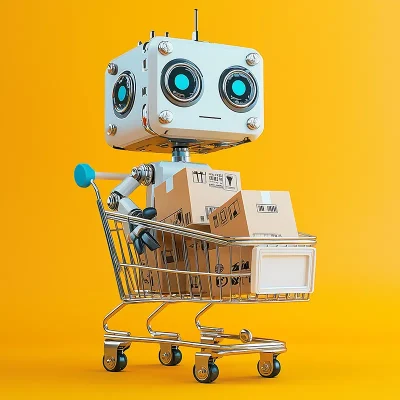While some of the hype around AI seems to be slowing from its lofty peaks of 2023, many are finding the real-world practical applications for the technology. For those with ecommerce websites AI can significantly enhance the performance, efficiency, and user experience for visitors.
Content
One of the obvious early benefits for users of the likes of ChatGPT was for its ability to generate content quickly. Inputting some bullet points and asking it to create product descriptions or SEO’d page titles prevented the horrible feeling of staring at a blank page waiting for inspiration.
That idea has now been built-in to the Shopify platform, where AI can be used to help write product descriptions from a basic prompt. For product images, Shopify have also introduced the ability to to transform backgrounds to showcase your product in multiple locations based on your prompt.
Popular SEO WordPress plugin YOAST has AI-powered suggestions for meta descriptions in the paid version of the add-on.
Personalisation
Artificial Intelligence can analyse the user data of people accessing your site helping you to find and retain customers. One of the more involved ways of using AI in ecom is to personalise a user’s shopping experience. Further than just a “welcome back” message or a generic “you may also like”, these tools analyse user behaviour based on past purchases and site browsing history to provided targeted and individually personalised product recommendations. BloomReach’s system allows for custom banners and targeted discounts moving away from site-wide one-size fits all marketing messages.
Search

One element in the sudden rise of AI was the improvement of natural language processing, which is how computers understand humans. Using NLP, AI can interpret the shopper’s query allowing you to more accurately understand their intent and deliver the search results they’re looking for. AI can also enhance search accuracy by adding synonyms, filling in missing words or phrases, and automatically correcting spelling errors. E.g. a search for “sneakers” could be substituted for a search for “trainers”.
As with site personalisation, a user’s on-site behaviour and purchase history can be used to aid with future intent, so when they do use the search on your site you can present items they may be more inclined to want. Klevu’s site search utililses machine learning and natural language processing for advanced configuration options.
Customer Services & Support
Chatbots have been around for a number of years, with many people suffering frustrating customer service encounters with them. However, some of the more modern bots can be almost undetectable from real humans for straightforward enquiries. Intercom.com’s Fin AI agent provides a live help service and pulls in information from across your website to make sure consumers get accurate answers.
Pricing
It takes a lot of time and research to know what to price your products in an ever-changing market. There are AI tools that can analyse market dynamics and competitor pricing to help you find the right price for your products. This can be coupled with other elements such as consumer demand and inventory levels for real-time dynamic pricing.
AI is transforming e-commerce, offering tools that can improve customer experience, personalization, search functionality, and pricing strategies. Even if some tools don’t fit your needs now, staying updated on AI trends ensures you’re ready to adapt and stay competitive as the technology evolves. Monitoring these trends can help you spot new opportunities, streamline operations, and future-proof your business in an ever-changing market.



